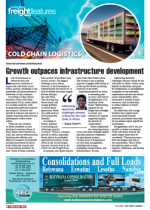Lack of investment in infrastructure and resources continues to impact the cold chain across Africa, posing a challenge to the perishable and pharmaceutical industries on the continent. According to Vijan Chetty, treasurer of the Cold Chain Association (CCA), South Africa is a notable exception, with strategically positioned airports and seaports. However, the growth in imports and exports is rapidly outpacing infrastructure development within South Africa.“There are 33 countries in Africa classified as least developed countries. Many of these nations have limited sea, road, rail, and air infrastructure, hindering the efficient and effective transport of perishable and pharmaceutical products both within the country and to international markets,” he said. “Some of these countries have pockets of excellence and success stories. The biggest challenge across Africa, however, is the investment in infrastructure and resources. A lack of reliable electricity supply further disrupts the cold chain. This shortage has forced many cold storage facilities to install diesel generators, which are costly and not environmentally f r iend ly.”According to Chetty, demand is increasing and delivering capacity is critical. “There is a distinct growth in Africa, especially South Africa, in perishable agricultural produce. South Africa is the second-largest exporter of citrus fruit in the world,” he told Freight News.At present, only Spain exports more citrus than South Africa. The country is also a leading exporter of apples, while Kenya is in the top five f lower-producing countries in the world. “Agricultural growth in Africa is increasing year-on-year,” said Stavros Evangelakakis, CCA chairman of the board. “Maintaining capacity for sea freight and airfreight is crucial. Any reduction in capacity negatively impacts the growth of commodities.”Chetty emphasised the rising importance of the cold chain alongside quality and phytosanitary compliance for agricultural produce. “Greater focus is being placed on cold chain management, including cold storage, packaging, transportation, and infrastructure,” he said.Addressing electricity challenges remains critical for the cold chain in Africa. “Africa relies heavily on electricity and gases for refrigeration. Local legislation compliance is the minimum requirement and does not always ensure sustainability. More investment is needed in basic resources, such as electricity, to reduce reliance on diesel generators.”He added that cold storage facilities must explore more environmentally friendly methods, particularly those that do not always require significant investments.Evangelakakis said it was not possible to isolate one element of the cold chain; instead, the entire supply chain must be considered. "The journey starts from the shipper and ends at the supermarket. This is where the industry needs to work together, collaborate, and develop solutions.”

